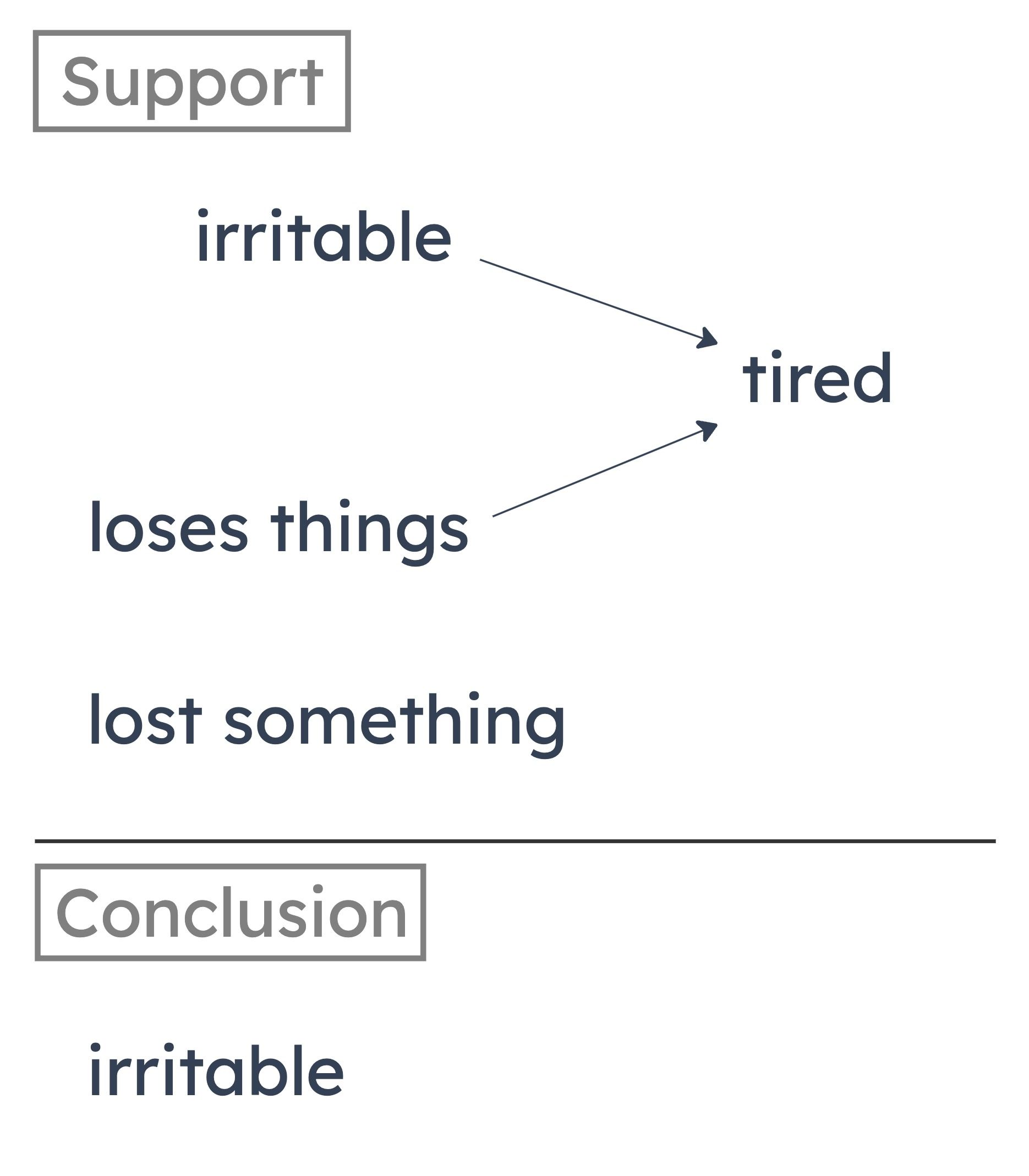LSAT 141 – Section 4 – Question 25
LSAT 141 - Section 4 - Question 25
September 2014You need a full course to see this video. Enroll now and get started in less than a minute.
Target time: 1:07
This is question data from the 7Sage LSAT Scorer. You can score your LSATs, track your results, and analyze your performance with pretty charts and vital statistics - all with a Free Account ← sign up in less than 10 seconds
| Question QuickView |
Type | Tags | Answer Choices |
Curve | Question Difficulty |
Psg/Game/S Difficulty |
Explanation |
|---|---|---|---|---|---|---|---|
| PT141 S4 Q25 |
+LR
| Flaw or descriptive weakening +Flaw Conditional Reasoning +CondR | A
10%
157
B
3%
154
C
2%
153
D
16%
158
E
70%
165
|
148 156 163 |
+Harder | 147.542 +SubsectionMedium |
J.Y.’s explanation
You need a full course to see this video. Enroll now and get started in less than a minute.
(1) If Roberta is irritable, then she is tired.
(2) If Roberta loses things, then she is tired.
(3) Roberta is yawning and she lost her keys.

The argument establishes that Roberta is tired, but the author treats “tired” as sufficient for “irritable.” According to premise 1, “tired” is necessary. In other words, Roberta could be losing things and therefore be tired but still not be irritable.
A
infers from a correlation between tiredness and yawning that tiredness causes yawning
B
assumes the conclusion that it sets out to prove
C
generalizes on the basis of a single instance
D
takes a necessary condition for Roberta’s losing things to be a sufficient condition
E
takes a necessary condition for Roberta’s being irritable to be a sufficient condition
Take PrepTest
Review Results
LSAT PrepTest 141 Explanations
Section 1 - Reading Comprehension
- Passage 1 – Passage
- Passage 1 – Questions
- Passage 2 – Passage
- Passage 2 – Questions
- Passage 3 – Passage
- Passage 3 – Questions
- Passage 4 – Passage
- Passage 4 – Questions
Section 2 - Logical Reasoning
- Question 01
- Question 02
- Question 03
- Question 04
- Question 05
- Question 06
- Question 07
- Question 08
- Question 09
- Question 10
- Question 11
- Question 12
- Question 13
- Question 14
- Question 15
- Question 16
- Question 17
- Question 18
- Question 19
- Question 20
- Question 21
- Question 22
- Question 23
- Question 24
- Question 25
Section 3 - Reading Comprehension
- Passage 1 – Passage
- Passage 1 – Questions
- Passage 2 – Passage
- Passage 2 – Questions
- Passage 3 – Passage
- Passage 3 – Questions
- Passage 4 – Passage
- Passage 4 – Questions
Section 4 - Logical Reasoning
- Question 01
- Question 02
- Question 03
- Question 04
- Question 05
- Question 06
- Question 07
- Question 08
- Question 09
- Question 10
- Question 11
- Question 12
- Question 13
- Question 14
- Question 15
- Question 16
- Question 17
- Question 18
- Question 19
- Question 20
- Question 21
- Question 22
- Question 23
- Question 24
- Question 25
- Question 26
Leave a Reply
You must be logged in to post a comment. You can get a free account here.